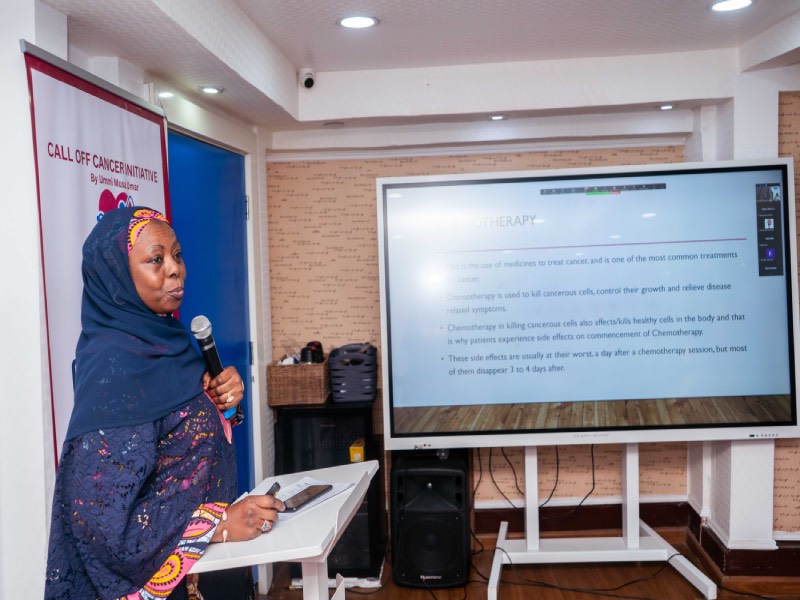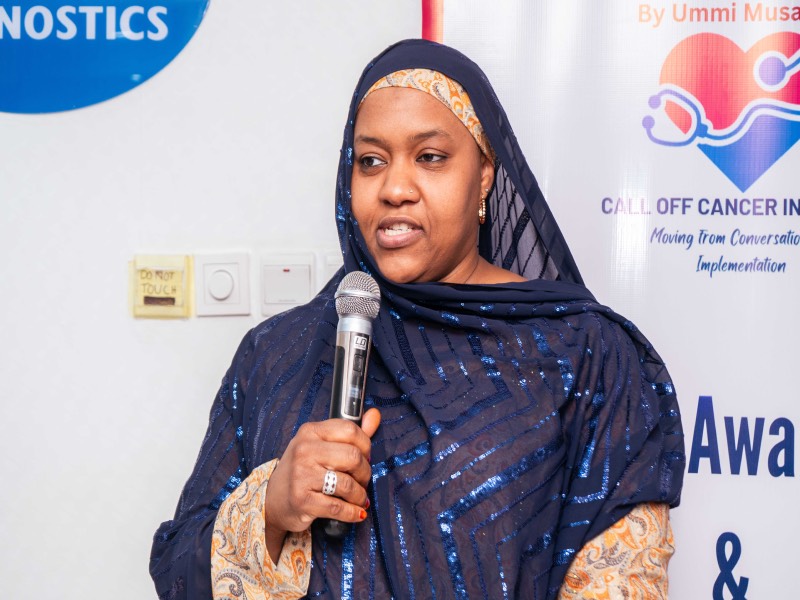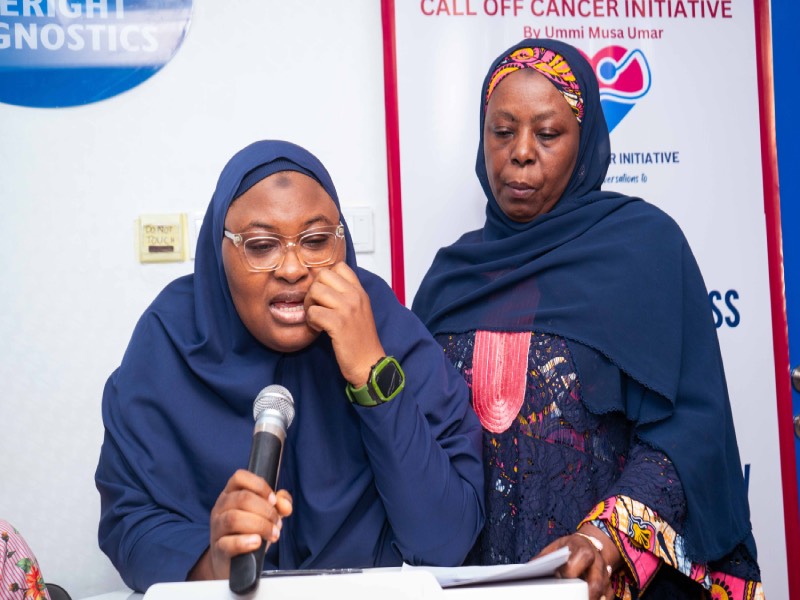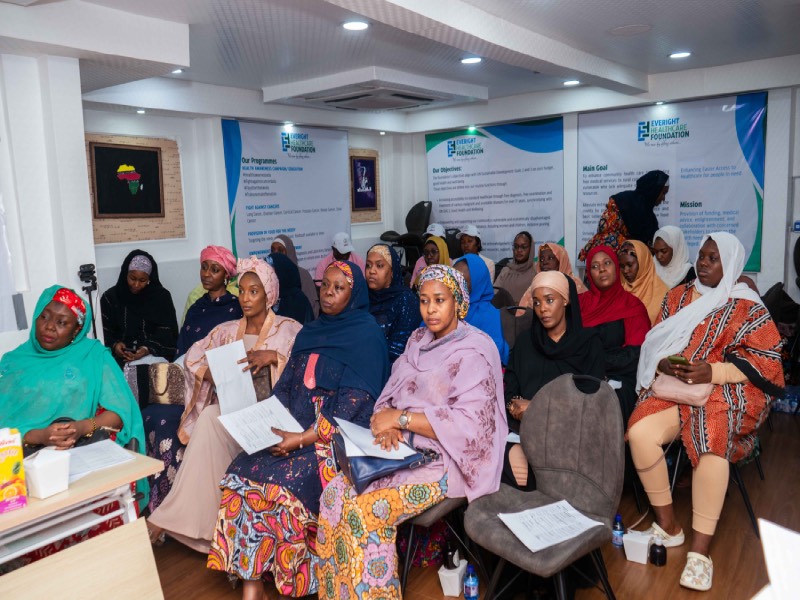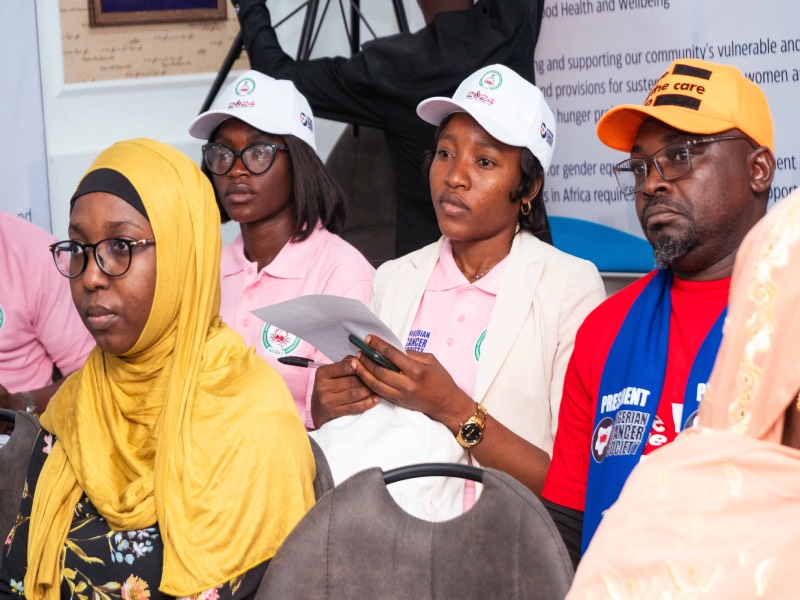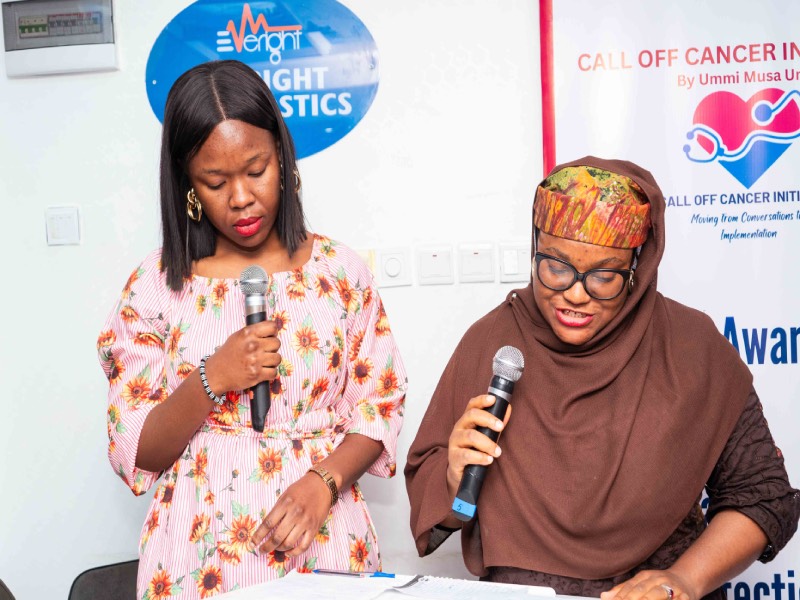Cancer Awareness & Screening
Highlighting the importance of early detection in breast, cervical, and prostate cancers.
Healthcare Investment & Partnerships
Promoting investments and collaborations in the healthcare sector to enhance cancer care.
Radiotherapy Access & Advocacy
Focusing on increasing accessibility and funding for radiotherapy treatments.
Community Engagement & Education
Addressing cancer myths, misinformation, and sensitizing grassroots communities.
In an emergency? Immediate Support Available.
Facing a crisis or in need of urgent support related to cancer care? Our team is here to provide immediate assistance and guidance. In challenging times, quick access to reliable information and support can make a significant difference.
Call Us Now: +234 906 4212 536About Us
A Non-governmental Organization founded by Ummi Musa Umar, a Cancer Advocate Certified by The Union for International Cancer Control. She is a Radiotherapy and Public Health Specialist with vast experience in Breast Imaging and Screening. She is an avid Researcher in the field of Oncology and an active member of The International Papillomavirus Society for her passion in contribution to the WHO’s Strategy to Accelerate the Elimination of Cervical Cancer.
By focusing on education, early detection, and support for those affected by cancer, the initiative aims to empower individuals and communities with the knowledge and tools needed to combat this disease.
Through a range of programs including community outreach, cancer screening campaigns, and advocacy for better healthcare services, Call Off Cancer Initiative strives to make a significant impact in the fight against cancer, ensuring access to quality care and information for all Nigerians.
Moving from Conversations to Implementations...
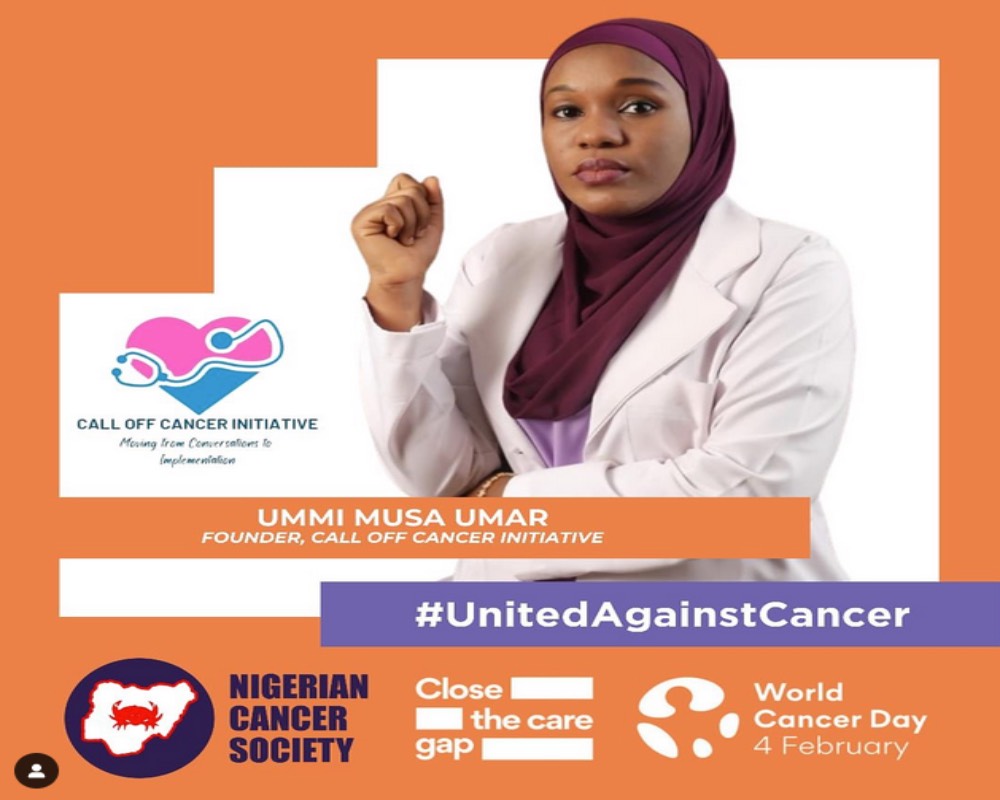
WHAT WE DO
- Educating the populace on early detection and screening especially in breast, cervical and prostate cancers.
- Encouraging and advocating investments in the healthcare sector, private partnerships and private cancer centres.
- Radiotherapy access and funding.
- Reaching the grass root where sensitization is much needed.
- Brainstorming the staggering high cancer statistics and the way forward.
- Handling myths, misinformation and cultural stereotypes.
Women reached for breast health education and screening
Learn more »Women reached for Cervical Cancer Screening
Discover more »People reached with prevention and early detection education
Explore Research »Successful collaborations
View Achievements »The Spectrum of Cancer: Varieties and Their Unique Challenges
Global Impact:
Cancer ranks as the second leading cause of death globally, underscoring the need for early detection and advanced treatments to save lives.
Lifestyle and Risk:
Diet, physical activity, and tobacco use significantly influence cancer risk, highlighting the importance of making healthy lifestyle choices.
Advances in Treatment:
Breakthroughs in medical research are paving the way for more effective treatments, such as targeted therapy and immunotherapy, enhancing patient outcomes.
Prevention and Screening:
Vaccinations for virus-related cancers and regular screenings are key preventive measures that help lower the overall incidence and mortality rates of cancer.
CALL OFF CANCER INITIATIVE
OUR MISSION
Our mission is to educate the community on what needs to be known about this disease by advocating preventive measures as tools for early detection in a way that can reach the grass root level, make cancer care accessible and affordable by the common citizen with emphasis on radiotherapy services, and provide a platform for making the cancer treatment journey easy for the patients and their families through our voice, initiatives and influence.
OUR VISION
Our vision is for the common citizen to live in a world where access to quality cancer care and educative resources are universal and equitable. We plan to achieve this by creating a community and collaborative network of expert stakeholders and passionate leaders from different walks of life. The most efficient way to do this is to build a region-specific network to advocate for our specific needs in cancer care. Call off cancer Initiative is taking the lead in advocating the agenda and proffering solutions during the radical disruption of our healthcare system post insurgency and in the midst of economic hardships, banditry, kidnapping, and profound backwardness in formal education.
Understanding Cancer: Types and Prevention
Breast Cancer
Breast cancer is one of the most common cancers worldwide, affecting millions of women each year. Early detection through mammograms can significantly improve treatment outcomes.
Prostate Cancer
Prostate cancer primarily affects men, especially those over the age of 50. Regular screenings, such as PSA tests, are crucial for early detection and effective management.
Lung Cancer
Lung cancer, often linked to smoking, is a leading cause of cancer-related deaths globally. Quitting smoking and avoiding secondhand smoke can reduce the risk of developing lung cancer.
Colorectal Cancer
Colorectal cancer, which affects the colon or rectum, can be effectively treated if detected early. Regular screening tests are recommended for adults starting at age 45.
Skin Cancer
Skin cancer, including melanoma, is the most common type of cancer but also one of the most preventable. Protection from UV radiation is key to prevention.
Leukemia
Leukemia is a type of cancer that affects the blood and bone marrow. There are various forms, some more common in children, others predominantly in adults.
Lymphoma
Lymphoma impacts the lymphatic system, which is part of the immune system. It is categorized into Hodgkin lymphoma and non-Hodgkin lymphoma, with different treatment approaches for each.
Cervical Cancer
Cervical cancer can be prevented through regular screening tests and receiving the HPV vaccine. Early stages often have no symptoms, making screening vital.
CANCER AWARENESS
Raising awareness about cancer is crucial in the fight against this complex disease. Knowledge empowers individuals to understand the importance of early detection, the benefits of lifestyle choices in cancer prevention, and the advancements in cancer treatment options.
Together, we can make a difference by spreading hope and encouraging those affected by cancer to lead active, informed lives.
Breast Cancer
Breast cancer is one of the most common cancers worldwide, affecting millions of women each year. Early detection through mammograms can significantly improve treatment outcomes.
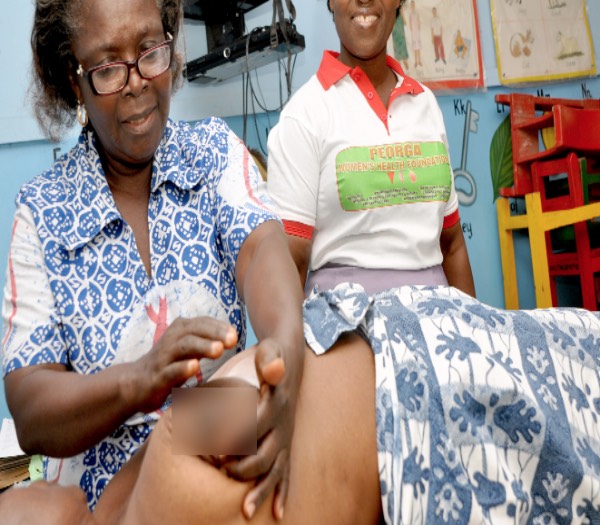
- Description: Uncontrolled growth of cells in the breast tissue.
- Risk factors: Age, family history, genetic mutations, lifestyle factors.
- Early detection methods: Mammograms, clinical breast exams, self-examinations.
- Treatments: Surgery, radiation therapy, chemotherapy, hormone therapy.
Cervical Cancer
Cervical cancer can be prevented through regular screening tests and receiving the HPV vaccine. Early stages often have no symptoms, making screening vital.
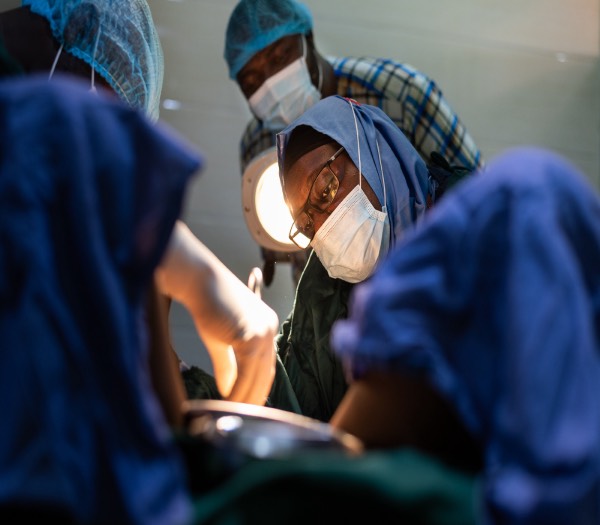
- Description: Uncontrolled growth of cells in the cervix, the opening to the uterus.
- Risk factors: Human papillomavirus (HPV) infection, early age of first sexual intercourse, multiple sexual partners.
- Early detection methods: Pap smears, HPV tests.
- Treatments: Surgery, radiation therapy, chemotherapy.
Prostate Cancer
Prostate cancer primarily affects men, especially those over the age of 50. Regular screenings, such as PSA tests, are crucial for early detection and effective management.

- Description: Uncontrolled growth of cells in the prostate gland, a male reproductive organ.
- Risk factors: Age, family history, African American race.
- Early detection methods: Prostate-specific antigen (PSA) test, digital rectal exams.
- Treatments: Surgery, radiation therapy, hormone therapy, watchful waiting.
Colorectal Cancer
Colorectal cancer, which affects the colon or rectum, can be effectively treated if detected early. Regular screening tests are recommended for adults starting at age 45.
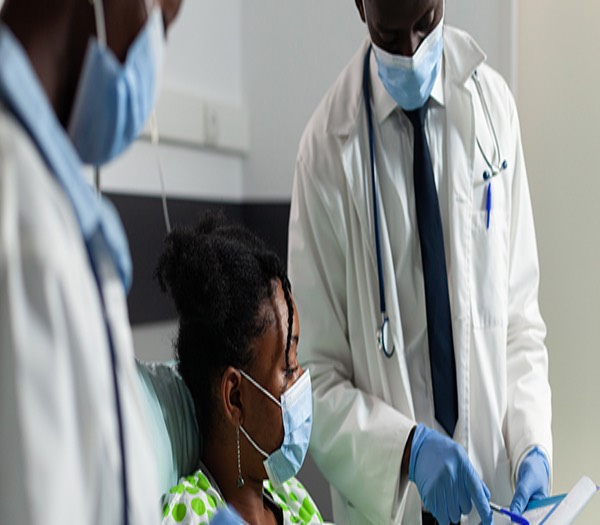
- Description: Uncontrolled growth of cells in the colon or rectum, parts of the large intestine.
- Risk factors: Age, family history, lifestyle factors like diet and lack of exercise.
- Early detection methods: Colonoscopies, stool tests.
- Treatments: Surgery, radiation therapy, chemotherapy.
Research
AREWA CANCER CONTROL COALITION
Empowering Communities, Defeating Cancer.
The Arewa Cancer Control Coalition, is a group of passionate Civil Society Organizations and Advocates across Northern Nigeria with the sole aim of tackling the menace of Cancer deaths by reaching grass-root indigent communities with awareness and patient support through a region-specific approach in local dialects tailored to the needs and understanding of the underserved, uneducated, and disease-ravaged communities that have been struggling with access to healthcare post boko-haram insurgency in Northern Nigeria.
On the 1st of September, the coalition launched a 3-month long advocacy campaign while collaborating with different organizations to give discounted cancer screening ranging from breast, cervical, prostate, liver and blood cancers.
A collaboration with the National Blood Service Agency led to a successful blood donation drive to help indigent cancer patients in need of blood.
RUGA OUTREACH
Investing in Health, Investing in the Future.
Earlier this year, we embarked on an outreach to the Nomadic Fulani settlements across Nigeria to fully understand their health challenges and intervene accordingly, this became an eye-opener to the health inequities ravaging communities in low/middle-income countries.
The estimated 50 million nomadic pastoralists in Africa are among the most “hard-to-reach” populations for health-service delivery. Some studies have identified these communities as potential disease reservoirs, particularly those slated for elimination and eradication.
The constant mobility of nomadic populations excludes them or places them at the edge of healthcare services. That made us very keen to understand causes and be a part of the solution for equitable access to healthcare services in every nook and corner of this planet.
Gallery
Explore our gallery to witness the powerful moments and activities at the heart of our mission. From community screenings and awareness campaigns to survivor stories and events, each photograph captures the spirit of hope, resilience, and solidarity that drives the Call Off Cancer Initiative.
Frequently Asked Questions
Understanding cancer is crucial for prevention, early detection, and effective treatment. Here are some frequently asked questions to help you get informed and take proactive steps towards cancer awareness and health.
-
What are the most common types of cancer in Nigeria?
The most common types of cancer in Nigeria include breast cancer, cervical cancer, prostate cancer, and colorectal cancer. Early detection and lifestyle changes can significantly improve outcomes for individuals affected by these cancers.
-
How can I reduce my risk of developing cancer?
Reducing cancer risk involves a combination of lifestyle changes such as maintaining a healthy diet, regular physical activity, avoiding tobacco and excessive alcohol consumption, and getting regular screenings for early detection of cancer.
-
What are the signs and symptoms of cancer I should look out for?
Common signs and symptoms include unexplained weight loss, persistent fatigue, changes in bowel or bladder habits, persistent cough or hoarseness, and lumps or areas of thickening that can be felt under the skin. It's important to consult a healthcare provider if you notice any of these symptoms.
-
How can I get screened for cancer?
Screening options vary depending on the type of cancer. Common screening tests include mammograms for breast cancer, Pap tests and HPV tests for cervical cancer, and colonoscopies for colorectal cancer. Consult your healthcare provider for recommendations based on your age, sex, and health history.
-
Where can I find support if I or a loved one is diagnosed with cancer?
Support is available through various cancer support groups, healthcare facilities, and non-governmental organizations focused on cancer care. These resources can offer emotional support, advice on treatment options, and assistance with navigating the healthcare system.
-
What advancements have been made in cancer treatment in recent years?
Recent advancements in cancer treatment include targeted therapy, immunotherapy, and precision medicine. These treatments aim to target cancer cells more effectively while minimizing damage to healthy cells, leading to better outcomes and fewer side effects for patients.
Contact
Our team is here to provide support, information, and answers to your questions about cancer awareness, prevention, and support services. Whether you're seeking advice, want to get involved, or need someone to talk to, we're just a message away. Reach out to us through any of the channels below, and we'll be in touch as soon as possible.
Our Address
Block C15 Flat 3, Aviation Village Estate, Airport Road Abuja
Email Us
info@calloffcancer.org
calloffcancer@gmail.com
Call Us
+234 906 4212 536
+234 705 2088 166


















